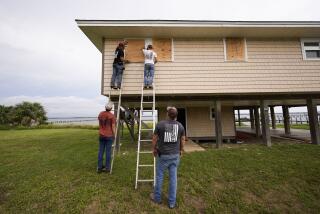New Kids on the Bloc Won’t Be Bullies, NATO Tells Russia
In a mission to calm fears over Western military expansion to Russia’s borders, NATO Secretary-General Jaap de Hoop Scheffer pledged Thursday that no troops or military hardware would be permanently deployed in the former Soviet republics that joined the alliance last month.
“The new NATO nations do not have any intention of building military infrastructure or stationing more troops on their soil ... which could run counter to the interests of Russia,” Scheffer said as he launched a series of meetings with Russian leaders, who have expressed alarm at the NATO beachhead on Russia’s western frontier.
The admission of Latvia, Lithuania and Estonia and four other East European nations to NATO marked a turning point for Moscow: The alliance created during the Cold War as a military counter to the former Soviet Union now includes for the first time not only former Warsaw Pact nations, but three former Soviet republics.
“A certain psychological shock is truly an important factor -- the older generation finds it extremely hard to accept that the military ports founded, for instance, by Peter the Great on the Baltic Sea all of a sudden become NATO’s military bases,” said Alexander A. Konovalov, president of the Moscow-based Institute for Strategic Assessment.
The Russian parliament insisted in a resolution that the new members adhere to the Treaty on Conventional Armed Forces in Europe, or CFE, a 1990 agreement limiting the deployment of military equipment and forces in front-line areas. If not, members of parliament said, they would call for Russia to back away from the pact and “emphasize the nuclear deterrent arsenals.”
Thursday’s meetings marked an attempt by both sides to reduce the tension. Russian President Vladimir V. Putin said the nation’s relations with NATO were “developing positively,” and he added that Russian officials “have not voiced any apprehensions” about NATO’s newest members in the Baltic region.
But he echoed previous Russian doubts about the need to expand a Cold War-era military alliance when new global threats -- especially terrorism and weapons of mass destruction -- are of a different nature.
“The contemporary menaces are so grave that NATO’s enlargement will not do away with them,” Putin said. “This expansion could not thwart acts of terror in Madrid, let’s say, or help us solve problems of restoring Afghanistan.”
Konovalov said Russian leaders feared that NATO was attempting to build a barrier against Russia and isolate it from Europe.
“There exists a multitude of opinions inside NATO, and one of these opinions posits that Russia is a murky, obscure and largely unpredictable country which has been growing muscle lately, and which threatens to become a rather strong totalitarian state 15 or so years from now,” he said. “This is when, some people in NATO must think, these barriers created in the Baltics, in Eastern and Central Europe, will come in very handy for keeping Russia at bay. And this is what Russia does not want to happen.”
The NATO secretary-general’s visit appeared to allay Russia’s biggest concern: that the conventional forces treaty -- an updated version of it has yet to be ratified -- does not apply to the new NATO members. Russians say that would mean there is no impediment to large deployments of NATO troops and equipment on Russia’s borders.
These fears were exacerbated when NATO this month stationed four fighter jets in Lithuania to patrol Baltic airspace, and Ukraine, which is not a NATO member, signed an agreement allowing alliance troops to transit its territory.
“We would prefer to see those nations join the [CFE] treaty without delay, as we believe that the treaty is the cornerstone of European security, and Russia would rather avoid a situation ... where a gray zone would appear where an arms buildup would be possible in those countries,” Foreign Ministry spokesman Alexander Yakovenko told reporters Thursday.
The U.S. and other NATO nations have held off on ratifying the treaty because of Russia’s failure so far to live up to its pledge to close its bases in neighboring Georgia and Moldova.
Scheffer said he believed that negotiations on that issue were progressing. He stressed that the Baltic republics were committed to living up to the spirit of the CFE treaty.
“Those relevant countries have stated that their ambition is not to act in contravention of CFE rules, as they exist at this moment,” Scheffer said at a Moscow news conference.
In an interview with Echo of Moscow radio, Scheffer characterized the meetings as talks between partners.
“NATO wants to cooperate,” he said. “We live in a dangerous world, and we can only solve these problems together.”
*
Alexei V. Kuznetsov of The Times’ Moscow Bureau contributed to this report.
More to Read
Sign up for Essential California
The most important California stories and recommendations in your inbox every morning.
You may occasionally receive promotional content from the Los Angeles Times.










